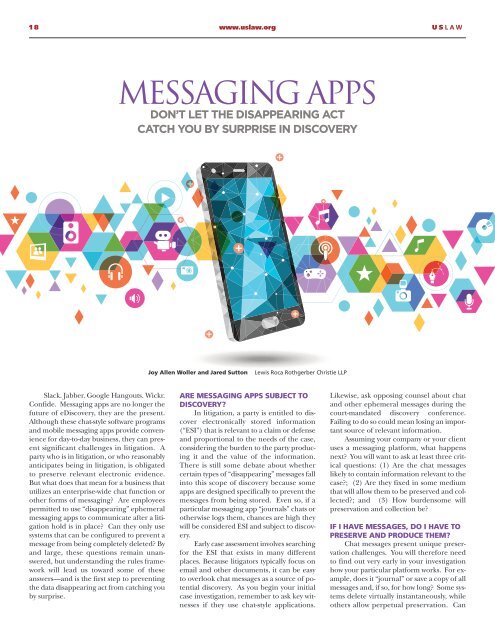USLAW-Magazine_FallWinter2018
Create successful ePaper yourself
Turn your PDF publications into a flip-book with our unique Google optimized e-Paper software.
1 8 www.uslaw.org U S L A W<br />
Messaging Apps<br />
DON’T LET THE DISAPPEARING ACT<br />
CATCH YOU BY SURPRISE IN DISCOVERY<br />
Joy Allen Woller and Jared Sutton<br />
Lewis Roca Rothgerber Christie LLP<br />
Slack. Jabber. Google Hangouts. Wickr.<br />
Confide. Messaging apps are no longer the<br />
future of eDiscovery, they are the present.<br />
Although these chat-style software programs<br />
and mobile messaging apps provide convenience<br />
for day-to-day business, they can present<br />
significant challenges in litigation. A<br />
party who is in litigation, or who reasonably<br />
anticipates being in litigation, is obligated<br />
to preserve relevant electronic evidence.<br />
But what does that mean for a business that<br />
utilizes an enterprise-wide chat function or<br />
other forms of messaging? Are employees<br />
permitted to use “disappearing” ephemeral<br />
messaging apps to communicate after a litigation<br />
hold is in place? Can they only use<br />
systems that can be configured to prevent a<br />
message from being completely deleted? By<br />
and large, these questions remain unanswered,<br />
but understanding the rules framework<br />
will lead us toward some of these<br />
answers—and is the first step to preventing<br />
the data disappearing act from catching you<br />
by surprise.<br />
ARE MESSAGING APPS SUBJECT TO<br />
DISCOVERY?<br />
In litigation, a party is entitled to discover<br />
electronically stored information<br />
(“ESI”) that is relevant to a claim or defense<br />
and proportional to the needs of the case,<br />
considering the burden to the party producing<br />
it and the value of the information.<br />
There is still some debate about whether<br />
certain types of “disappearing” messages fall<br />
into this scope of discovery because some<br />
apps are designed specifically to prevent the<br />
messages from being stored. Even so, if a<br />
particular messaging app “journals” chats or<br />
otherwise logs them, chances are high they<br />
will be considered ESI and subject to discovery.<br />
Early case assessment involves searching<br />
for the ESI that exists in many different<br />
places. Because litigators typically focus on<br />
email and other documents, it can be easy<br />
to overlook chat messages as a source of potential<br />
discovery. As you begin your initial<br />
case investigation, remember to ask key witnesses<br />
if they use chat-style applications.<br />
Likewise, ask opposing counsel about chat<br />
and other ephemeral messages during the<br />
court-mandated discovery conference.<br />
Failing to do so could mean losing an important<br />
source of relevant information.<br />
Assuming your company or your client<br />
uses a messaging platform, what happens<br />
next? You will want to ask at least three critical<br />
questions: (1) Are the chat messages<br />
likely to contain information relevant to the<br />
case?; (2) Are they fixed in some medium<br />
that will allow them to be preserved and collected?;<br />
and (3) How burdensome will<br />
preservation and collection be?<br />
IF I HAVE MESSAGES, DO I HAVE TO<br />
PRESERVE AND PRODUCE THEM?<br />
Chat messages present unique preservation<br />
challenges. You will therefore need<br />
to find out very early in your investigation<br />
how your particular platform works. For example,<br />
does it “journal” or save a copy of all<br />
messages and, if so, for how long? Some systems<br />
delete virtually instantaneously, while<br />
others allow perpetual preservation. Can


